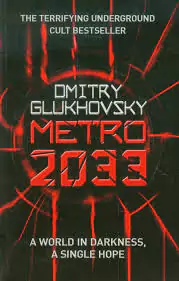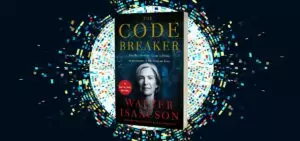 Science fiction is to some extent a rather conservative genre, as it is based mostly on long-established canons. Each science-fiction sub-genre, be it space opera, fighting fantasy, post-apocalypse, or a philosophical contemplation of the humanity’s future has its own cliches and, rather often, even settings. In my opinion, the success of almost every particular science-fiction novel to a significant degree depends on how skillfully authors can exploit these rules, and on how organically they manage to fit the plot in respective limits. And whereas many writers seem to bet either on plot or on cliches, a young Russian writer, Dmitry Glukhovsky, the author of the “Metro 2033” bestseller, proved to be competent in both.
Science fiction is to some extent a rather conservative genre, as it is based mostly on long-established canons. Each science-fiction sub-genre, be it space opera, fighting fantasy, post-apocalypse, or a philosophical contemplation of the humanity’s future has its own cliches and, rather often, even settings. In my opinion, the success of almost every particular science-fiction novel to a significant degree depends on how skillfully authors can exploit these rules, and on how organically they manage to fit the plot in respective limits. And whereas many writers seem to bet either on plot or on cliches, a young Russian writer, Dmitry Glukhovsky, the author of the “Metro 2033” bestseller, proved to be competent in both.

✅ AI Essay Writer ✅ AI Detector ✅ Plagchecker ✅ Paraphraser
✅ Summarizer ✅ Citation Generator
Briefly: after a nuclear world war broke out (cliche!), the rest of the Russian capital’s population sought asylum underground—in a metro. After it was clear there was no life left on the surface, people started to adapt to the new living conditions. Pretty soon, metro stations turned into mini-countries, each with its own laws and citizens; these countries formed federations, alliances, or declared wars—like in the above-ground world forever lost long ago. As if it was not enough for an intriguing storyline, Glukhovsky filled his dark world with gruesome radiation-spawned creatures (cliche!), and unexplained mystical phenomenons. Talking about the latter, some of them will definitely make you forget you are reading regular fiction and prompt you to think you are reading horror. One day, a new danger appears in Moscow metro tunnels; the danger is so great that all other threats grow dim compared to it. Artyom, a metro inhabitant who seems to be somehow connected to this new danger, has to go on a journey to alert the rest of humanity. This is where the storyline starts…
“Metro 2033” possesses an unexpectedly grim and hopeless atmosphere; in my opinion, this is the most convex feature of the book, and its biggest advantage. Today, it is not a secret that in the Soviet Union, many metro stations were designed as potential bunkers; considering the Caribbean crisis, it was a wise security measure. Hence, describing the dark world of year 2033, Glukhovsky fully exploits both real facts and urban legends about Soviet metro stations, the government, KGB, and other intriguing subjects. This material is heavily diluted with the more-recent folklore of the survivors; Glukhovsky carefully describes newborn myths. As it was already mentioned, some of them are rather creepy; their descriptions are so skillfully done and realistic that I guarantee that after reading “Metro 2033” you will think twice before using the metro next time. Industrial scenes, scenes of miserable life, and a constant expectation of something horrible lurking in the dark of the tunnels will make your blood chill even on a warm sunny afternoon.
What I disliked about the book was its language. “Metro 2033” was the first book ever written by Dmitry Glukhovsky, and it was obvious even though I was reading it in English. Perhaps, I am too subjective or picky, but sometimes events and descriptions are too straightforward; sometimes a different word choice would improve a scene; sometimes, you can notice forced solutions and miraculous savings. A peaceful civilian Artyom sometimes reminded me of a dummy, as he seemed to be acting automatically or imperturbably, even in situations when a brave soldier would faint; the book definitely lacks descriptions of his emotions.
It is all normal though. “Metro 2033” is a book that speaks for itself. The story is as direct as the subway tunnel, and to the same extent, dark and mysterious. The atmosphere is perfect—I have no other words to describe it. Mistakes and flaws are sometimes noticeable but forgivable. Hence, “Metro 2033” is definitely a book to read in the nearest future.
P.S. If you use the metro often—you are lucky. The impression from the book doubles if you read it underground.
Follow us on Reddit for more insights and updates.





Comments (0)
Welcome to A*Help comments!
We’re all about debate and discussion at A*Help.
We value the diverse opinions of users, so you may find points of view that you don’t agree with. And that’s cool. However, there are certain things we’re not OK with: attempts to manipulate our data in any way, for example, or the posting of discriminative, offensive, hateful, or disparaging material.
Comments are closed.